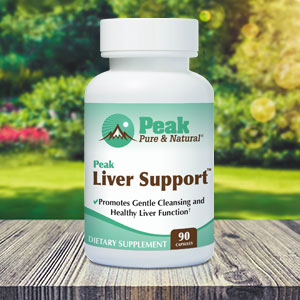Get Easy Health Digest™ in your inbox and don’t miss a thing when you subscribe today. Plus, get the free bonus report, Mother Nature’s Tips, Tricks and Remedies for Cholesterol, Blood Pressure & Blood Sugar as my way of saying welcome to the community!
How a fatty liver can exponentially raise dementia risk

Non-alcoholic fatty liver disease (NAFLD) now affects a quarter of the world’s population, making it the most common chronic form of liver disease.
In fact, you could have it right now and not even know, for a couple of reasons…
While some with a fatty liver experience fatigue and discomfort in their upper right abdomen, many people have no symptoms at all.
And while obesity is a risk factor for NAFLD, even lean people can experience a health-destroying buildup of fat in their livers.
In most people, NAFLD doesn’t progress — but for the unlucky 20 to 30 percent, it can lead to liver inflammation and damage that progresses to nonalcoholic steatohepatitis (NASH), which can then lead to cirrhosis or even liver cancer.
But regardless of whether it does or not, there’s another really big problem…
People with NAFLD are at a higher risk for dementia. And if you factor in another common condition affecting almost 30 million Americans, that dementia risk skyrockets…
How fatty liver, heart disease and stroke drastically elevate dementia risk
According to researchers from the Karolinska Institute in Stockholm, Sweden, not only is NAFLD associated with a higher risk of dementia, but if you have heart disease and related health issues, your dementia risk is through the roof.
The researchers accessed 30 years of national Swedish patient registry records, identifying 2,898 people age 65 and older who were diagnosed with NAFLD. They also identified a control group of 28,357 people without the disease who were matched for age, sex and their city of residence at age of diagnosis to keep things fair.
Here’s what they found…
People with NAFLD had a slightly higher risk of dementia than those without the disease (5% compared to 4.6%). But after adjusting for cardiovascular risk factors like high blood pressure and diabetes, that risk skyrocketed…
Compared to people without the liver disease, people with NAFLD plus those cardiovascular risk factors had a whopping 38 percent higher rate of dementia overall.
But because high blood pressure and diabetes are among risk factors for vascular dementia (caused by inadequate blood flow to the brain), the researchers decided to factor that in…
They found people with NAFLD had a 44 percent higher risk of vascular dementia than people without the liver disease.
I wish I could tell that was the worst of it, but I can’t…
The team also discovered that for people living with NAFLD plus heart disease, or for those who had NAFLD and had suffered a stroke, the risks were even greater:
- The combination of NAFLD and heart disease raised the risk of dementia by 50 percent.
- Those with the liver disease who suffered a stroke had more than a 2.5 times greater risk of dementia.
“Our study shows that non-alcoholic fatty liver disease is associated with the development of dementia, which may be driven mainly by vascular damage in the brain,” said study author, Ying Shang, PhD. “These results highlight the possibility that targeted treatment of this form of liver disease and co-occurring cardiovascular disease may reduce the risk of dementia.”
Trim your liver and your risk for dementia
So what can you do about a fatty liver?
Lifestyle changes are the foundation of early NAFLD treatment and prevention efforts, and include:
- Reducing fat intake
- Limiting sugar consumption
- Choosing more fiber-rich vegetables and whole grains.
- Avoiding alcohol consumption.
Also, eat more protein. Research has shown that increasing the amount of protein in your diet after weight loss may help reduce the fat content in your liver and even reverse fatty liver disease.
It also helps to support your liver’s processes which include filtering the blood of fat-storing toxins.
Next, don’t forget to work on any contributors to heart disease or stroke risk…
- Exercise can be just as effective as medication to lower blood pressure. So do some every day! But if exercise is difficult for you, reach for nutrients that can also help, like vitamin K2 and nitric oxide.
- Eat the berry that improved blood flow. In just 30 days, powdered cranberry consumption improved flow-mediated dilation (FMD), which signals improvement of heart and blood vessel function.
- Boost brain blood flow with flavonoids. Researchers highlighted a significant link between reduced cognitive decline and consumption of flavonoid-rich foods like strawberries, citrus fruits, apples, pears, celery, peppers and bananas.
Editor’s note: While you’re doing all the right things to protect your brain as you age, make sure you don’t make the mistake 38 million Americans do every day — by taking a drug that robs them of an essential brain nutrient! Click here to discover the truth about the Cholesterol Super-Brain!
Sources:
Study: Liver disease linked to higher risk of dementia – EurekAlert!













